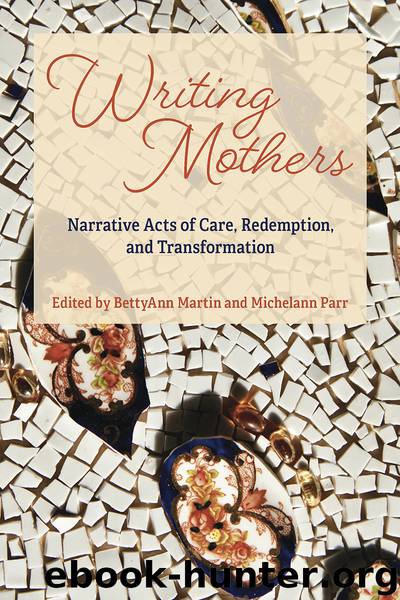Writing Mothers by BettyAnn Martin

Author:BettyAnn Martin
Language: eng
Format: epub
Publisher: Demeter Press
Published: 2020-06-15T00:00:00+00:00
Reclaiming Motherhood as Readers and Writers
Chapter Eight
Redemptive Mothering: Reclamation, Absolution, and Deliverance in Emma Donoghue’s Room and The Wonder
Andrea O’Reilly
“… the shadowy secret behind the miracle is precisely the redemptive power of mothering … an empowered practice of resistance and salvation for children and mothers.”
In her review “Shadowy Secrets behind a Proclaimed Miracle,” Arlene McKanic asks, “Is Emma Donoghue cultivating a new genre? Call it emergency motherhood. Like her 2010 bestseller Room, Dononghue’s ninth novel (The Wonder, 2016) features a woman whose existence is bent around the life, health, and happiness of a child whose circumstances are desperate”(1). In this chapter, I consider how Donoghue’s two novels Room and The Wonder perform “emergency motherhood” by positioning mothering specifically as a redemptive practice. I further explore how maternal practice in Room and The Wonder achieve reclamation, absolution, and deliverance to perform emergency motherhood, as observed by McKanic. Redemption refers to both reclamation—the action of regaining or gaining possession of something in exchange for payment or for clearing a debt—and absolution—the action of saving or being saved from sin, error, or evil. In Room, redemption is enacted through reclamation: Ma reclaims the maternal authenticity of her maternal practice as well as her close bond with her son. In The Wonder, Rosaleen also seeks redemption but not through reclamation of the mother-child relationship; rather, she seeks it through absolution to save her daughter and son from incest. In other words, for Ma, redemption means the repossession of her relationship with Jack, whereas for Rosaleen, it means saving her children from the sin of incest. In The Wonder, redemption also assumes another meaning and practice—that of deliverance. The Wonder opens with Rosaleen’s redemptive attempt at salvation for her daughter and concludes with Lib saving Anna through the redemptive act of deliverance.
Indeed, what this chapter argues—to unpack the title of McKanic’s review—is that the shadowy secret behind the miracle is precisely the redemptive power of mothering. More specifically, the chapter contends that in being redemptive, mothering emerges as empowered practice of resistance and salvation for children and mothers.
“All Those Years, I Kept Him Safe”: Redemption as Reclamation in Room
In a 2010 interview, Emily Donoghue comments, “Room is a universal story of parenthood and childhood, and in Jack and Ma’s relationship I wanted to dramatise the full range of extraordinary emotions parents and children feel for each other: to put mothering in a weird spotlight and test it to its limits” (“On Room”). In another interview, she elaborates, “I tried to take the common or garden experience of parenting and just by isolating it under a spotlight, I tried to bring out the true, crazy drama of parenting” (“In Donoghue’s Room”). The novel Room, to use Donoghue’s words, seeks to examine “an extraordinary act of motherhood” (qtd. in Ue) through what she terms “a defamiliarisation of ordinary parenthood” (qtd. in Crown). Using feminist philosopher Sara Ruddick’s theory of maternal practice, this section explores how Donoghue, in making the commonness of motherhood extraordinary, positions Ma’s mothering as both redemptive and resistant.
Download
This site does not store any files on its server. We only index and link to content provided by other sites. Please contact the content providers to delete copyright contents if any and email us, we'll remove relevant links or contents immediately.
Call me by your name by Andre Aciman(4672)
Rowling, J.K - Harry Potter 02 - Harry Potter and the Chamber of Secrets by Rowling J K(3306)
Paardenranch heartland - vol vertrouwen by Lauren Brooke(3149)
Harry Potter and the Chamber of Secrets (Book 2) by J.K. Rowling(2807)
The Kiss of Deception by Mary E. Pearson(2779)
Day by Elie Wiesel(2778)
Harry Potter and the Goblet of Fire (Book 4) by J.K. Rowling(2749)
A Thousand Splendid Suns by Khaled Hosseini(2692)
Holes by Louis Sachar(2666)
How to Make a Wish by Ashley Herring Blake(2574)
Just Listen by Sarah Dessen(2573)
I've Got Your Number by Sophie Kinsella(2530)
Bossypants by Tina Fey(2517)
Holding Up the Universe by Jennifer Niven(2491)
Talking as Fast as I Can by Lauren Graham(2435)
Confessions of a Shopaholic by Sophie Kinsella(2338)
Call Me by Your Name: A Novel by André Aciman(2198)
The Body Keeps the Score by Bessel van der Kolk MD(2190)
No Time to Say Goodbye(2108)
